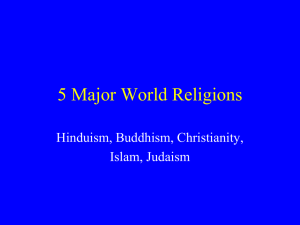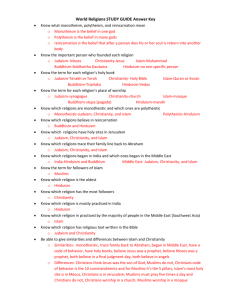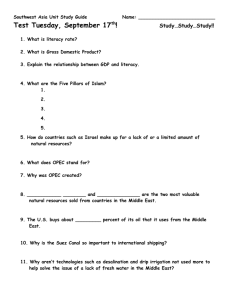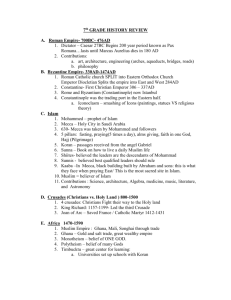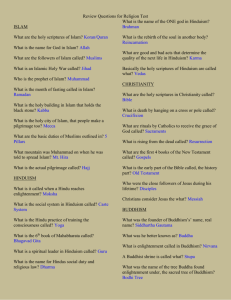Belief Systems Vocabulary
advertisement
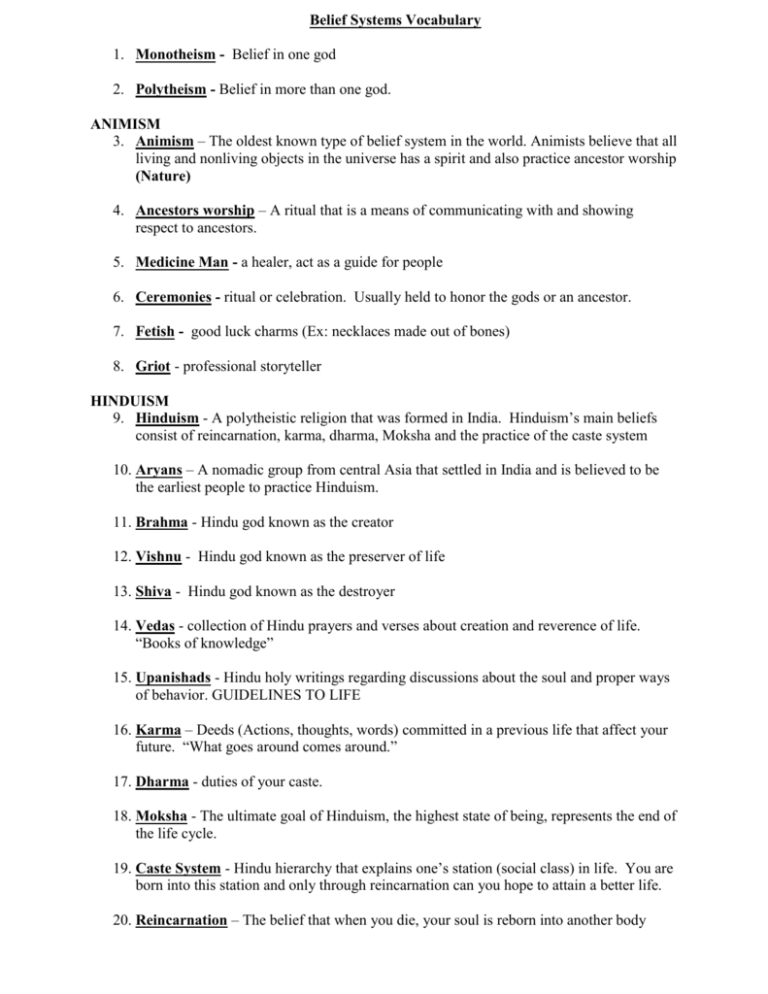
Belief Systems Vocabulary 1. Monotheism - Belief in one god 2. Polytheism - Belief in more than one god. ANIMISM 3. Animism – The oldest known type of belief system in the world. Animists believe that all living and nonliving objects in the universe has a spirit and also practice ancestor worship (Nature) 4. Ancestors worship – A ritual that is a means of communicating with and showing respect to ancestors. 5. Medicine Man - a healer, act as a guide for people 6. Ceremonies - ritual or celebration. Usually held to honor the gods or an ancestor. 7. Fetish - good luck charms (Ex: necklaces made out of bones) 8. Griot - professional storyteller HINDUISM 9. Hinduism - A polytheistic religion that was formed in India. Hinduism’s main beliefs consist of reincarnation, karma, dharma, Moksha and the practice of the caste system 10. Aryans – A nomadic group from central Asia that settled in India and is believed to be the earliest people to practice Hinduism. 11. Brahma - Hindu god known as the creator 12. Vishnu - Hindu god known as the preserver of life 13. Shiva - Hindu god known as the destroyer 14. Vedas - collection of Hindu prayers and verses about creation and reverence of life. “Books of knowledge” 15. Upanishads - Hindu holy writings regarding discussions about the soul and proper ways of behavior. GUIDELINES TO LIFE 16. Karma – Deeds (Actions, thoughts, words) committed in a previous life that affect your future. “What goes around comes around.” 17. Dharma - duties of your caste. 18. Moksha - The ultimate goal of Hinduism, the highest state of being, represents the end of the life cycle. 19. Caste System - Hindu hierarchy that explains one’s station (social class) in life. You are born into this station and only through reincarnation can you hope to attain a better life. 20. Reincarnation – The belief that when you die, your soul is reborn into another body BUDDHISM 21. Buddhism – Belief system founded in India founded by Siddhartha Gautama (Buddha) that spread to East Asia and SE Asia; It’s main beliefs include reincarnation, karma, the Four Nobles Truths, the Eight-Fold Path and Nirvana 22. Buddha – Name given to Siddhartha Gautama, the founder of Buddhism which means “Enlightened One” 23. Four Noble Truths - Siddhartha Gautama’s (Buddha) teaching that suffering is a result of one’s people’s desire and that desire can be eliminated by following the 8-Fold Path 24. Noble Eight Fold Path - Guidelines that Buddhists must follow to achieve Nirvana. 25. Nirvana - The goal of all Buddhists and when achieved, a person is the release from the cycle of life. CONFUCIANISM 26. Confucianism – Belief system founded in China by Confucius. It provides guidance on how to live your life and provided social and political order to China; Main beliefs consist of Filial piety and the Five Relationships 27. Confucius - A Chinese scholar and politician. Founded the philosophy of Confucianism. 28. Five Relationships - Confucianism teaches that there is a natural social order to society which can best be explained through the Five Relationships: Ruler to subject, Father to son, Older brother to younger brother, Husband to wife, Friend to friend 29. Filial Piety - Respect for your parents and elders 30. Jen – Human kindness should be shown towards one another. 31. Li - Proper etiquette should always be used, and one should strive to achieve perfect virtue. 32. Gentry - The educated, upper class DAOISM/TAOISM 33. Daoism/Taoism - Belief system in China founded by Lao-tzu that emphasizes living simply and in harmony with nature; Beliefs include the yin and yang 34. Lao-tzu - Founder of Daoism/Taoism 35. Dao/Tao – It a philosophy which teaches that nature has a "way" in which it moves and that people should passively accept the "way" of nature, rather than resist it. 36. Wu-wei - Philosophy which means "not doing." This means that people should not act unnaturally by doing things, but rather should openly accept the natural way 37. Yin and Yang – In Daoism, they are known as the opposing forces of nature, representing the male and female aspects of life JUDAISM 38. Judaism – Oldest monotheistic religion in the world founded by Abraham (Moses) in the Middle East (today’s Israel); Main beliefs include: Monotheism, the 10 Commandments, the readings of the Torah and the Talmud 39. Covenant - An agreement between God and his people 40. Torah – The Holy book for Jews (The first 5 books of the Old Testament) 41. Diaspora - The scattering of the Jewish people throughout the world due to persecution, slavery and the Holocaust 42. Talmud - A book of ethical decisions written by Jewish religious leaders 43. Salvation - To be saved 44. Ten Commandments - The foundation of ethical and religious beliefs for Christians and Jews. (Guidelines of life) CHRISTIANITY 45. Christianity – Second oldest monotheistic religion founded by Jesus in Jerusalem whose branches include: Roman Catholicism, Protestantism, and Eastern Orthodoxy ; Main beliefs include: The Holy Trinity, the 10 Commandments, atonement, and readings from the Old and New Testaments (Bible) 46. Jesus - Founder of Christianity; Christians believe he is the son of God and the Messiah (Savior) 47. Holy Trinity - formed by the Creator (Father), Redeemer (Son), and Sustainer (Holy Spirit). Christians believe that these three entities are all part of a single higher power. 48. Old Testament - Stories written in the first half of the Bible that were prior to the life of Jesus. (The torah) 49. New Testament - Section of the Bible that contains stories regarding the life and teachings of Jesus. 50. Bible - Holy book for Christians. 51. Atonement - Forgiveness of sins. 52. Messiah - A savior; name given to Jesus. (Christ) 53. Great Schism - The split within the Christian church dividing it into Roman Catholicism in the West and Greek Orthodox in the East – 1054 C.E. 54. Roman Catholicism – The largest Christian branch and claims over a billion members, representing approximately half of all Christians. The Church's highest earthly authority is the Pope. This branch of Christianity is predominately practiced in Western Europe and the Latin America. (Latin based) 55. Eastern Orthodoxy - The 2nd largest Christian branch, estimated to number between 225 and 300 million members. The highest earthly authority is the Patriarch. This branch of Christianity is predominately practiced in Eastern Europe and Russia. (Greek) 56. Protestant Christianity – A branch within Christianity, containing many denominations of different practices and doctrines that originated in the sixteenth-century Reformation (Branches include: Lutheran, Presbyterian, Baptist, Anglican, etc.) These branches of Christianity are predominately practiced in Western Europe and the United States (Vernacular) 57. Martin Luther – German Monk who started the Protestant Reformation. Wrote and posted the 95 theses (his complaints against the Catholic Church) 58. Indulgences - Certificates the Catholic Church sold in order to forgive one’s sins. 59. Justification by faith - Martin Luther’s theory that any action (sin) can be forgiven by having faith in God. 60. John Calvin - Reformation leader who created a Protestant religious community in Geneva, Switzerland 61. Predestination - John Calvin’s theory that God pre-determined your destiny (Salvation) before you were born ISLAM 62. Islam – The youngest monotheistic religion in the world; founded by Muhammad, in Mecca. 63. Shia Islam (Shiite Muslim) – Shia is the minority branch of Islam; The followers of Shia Islam are called Shi'ites. Shiite Muslims believe that the that Muhammad's family and certain individuals among his descendants should be the Caliph 64. Sunni Islam (Sunni Muslim) - Sunni Islam is the largest denomination of Islam; Sunni Muslims believe that the Caliph should be chosen from the community. 65. Muslim - A follower of the Islamic faith. 66. Muhammad - In the Islamic faith he is considered a prophet (Messenger of God) and the founder of the faith. 67. Koran (Qur’an) – The Islamic holy book. 68. Jihad - Islam’s holy struggle to spread its faith and can be considered a “Holy War” 69. Hegira/Hejira - Muhammad’s pilgrimage from Mecca to Medina; 1st year in Islamic calendar 70. Five Pillars of Islam (Faith) - Outlines the duties of the Islamic religion. 71. Alms - Giving charity - one of the 5 Pillars of Islam 72. Hajj - Name of the pilgrimage to Mecca that every Muslim must make. One of the 5 pillars of faith. 73. Ramadan - 9th month of the Muslim calendar in which Muslims fast from sunrise to sunset - one of the 5 Pillars of Islam 74. Caliph – The Religious leader of the Muslim world. 75. Mosque - Holy place of worship for Muslims
